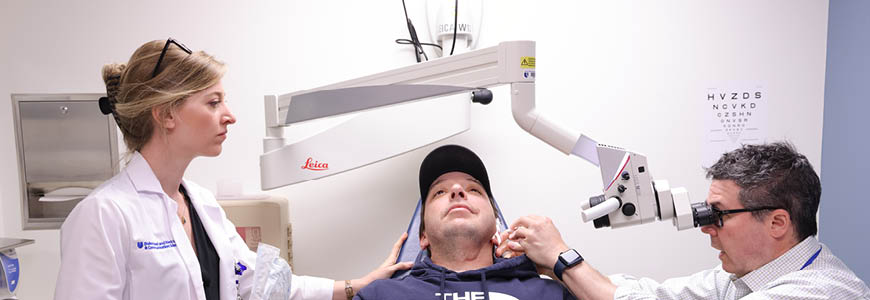The Duke Skull Base Center stands out for its patient-friendly ease of use thanks to nurse navigators, specialty training of surgeons and other physicians, multidisciplinary approach, and innovative treatments.

- A commitment to seeing a new patient within 48 hours.
- The convenience of two locations—in Raleigh and Durham—with a nurse navigator at each.
- The opportunity for patients to participate in clinical trials.
- A free second opinion line where experts review a patient’s information and let them know whether Duke can add value to their management.
Nurse navigator support
Skull base tumors require multidisciplinary care that can leave patients feeling overwhelmed by the need to deal with the offices of many specialists from a variety of fields, says Ralph Abi Hachem, MD, MSc, director of the Skull Base Center. Duke has solved this challenge by assigning each patient a nurse navigator who serves as a single point of contact, working with all these specialists to smooth the way for the patient’s care.
The nurse navigator aims to arrange for a one-day visit during which the patient can be seen by several specialists, such as an ENT, neurosurgeon, radiation oncologist, and ophthalmologist; get any MRIs, PET scans or other imaging done; and have blood drawn for lab tests. The patient can then be on their way and the nurse navigator will be in touch about their test results.
“The nurse navigator will schedule their surgery and post-op follow-ups, and then ensure a smooth transition back to the referring provider, with continuous direct access to the Duke team if needed,” Abi Hachem says.
Multidisciplinary approach, innovative treatments
“Another aspect of our multidisciplinary approach is that all patients are reviewed through our Skull Base and Head and Neck Multidisciplinary Tumor Board or our Multidisciplinary Pituitary Conference, where experts from different specialties meet to provide their input,” Abi Hachem says. “The radiologist, radiation oncologist, neurosurgeon, ENT, endocrinologist, and ophthalmologist all sit down and review in detail all the patients’ cases, especially the complex ones, and come up with a comprehensive management plan.”
The center is recognized as a multidisciplinary team of distinction by the North American Skull Base Society because of the specialized training of its practitioners in techniques such as minimally invasive endoscopic surgery and because it strives to offer the most innovative treatments. In recent years, the center’s research has been supported by more than $1.1 million in funding from the National Institutes of Health, industry partners, and the North American Skull Base Society.